Backyard chickens have become increasingly popular among those looking for a sustainable source of cage-free eggs. Just like cats and dogs, chickens need physical and mental stimulation to live happy and healthy lives. Providing enrichment to chickens has many benefits, including:
- Provides the opportunity to perform natural behaviours
- Keeps chickens engaged, reducing boredom and building cognitive function
- Reduces negative emotional states, including fear, stress, and frustration
- Reduces harmful behaviours, such as bullying and feather pecking
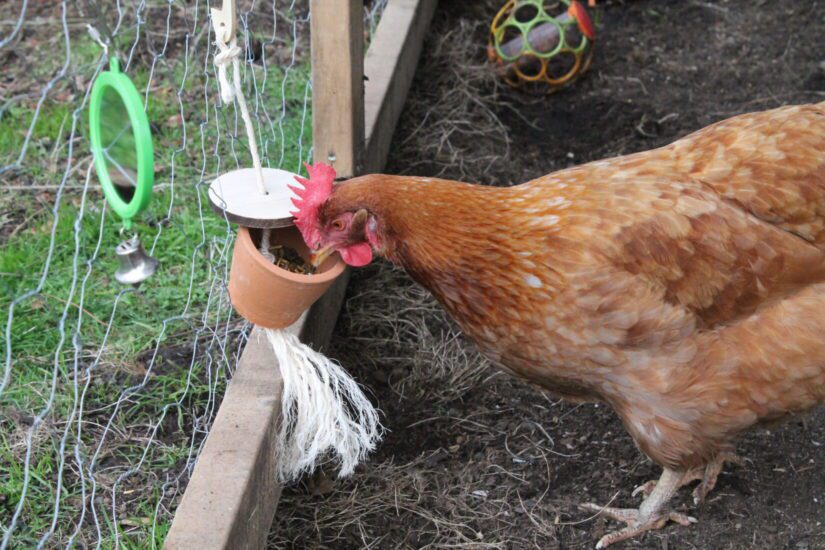
There are many different types of enrichment that can be easily implemented in backyard flocks. Whether you have chickens of your own, or are simply a chicken enthusiast, check out these chicken boredom busters!
1. Social enrichment
Chickens are social animals, and do best when they are in the company of other chickens. In fact, it is often a requirement in municipalities that allow backyard chickens that there must be a minimum of two.
2. Environmental enrichment
Adding physical elements to the chickens’ environment is a great way to encourage chickens to explore, exercise, and perform their natural behaviours.
Jungle gyms
Ladders, bridges, swings, teeter totters, ramps, and platforms are fun additions that can be purchased online or easily made with materials found around your home.
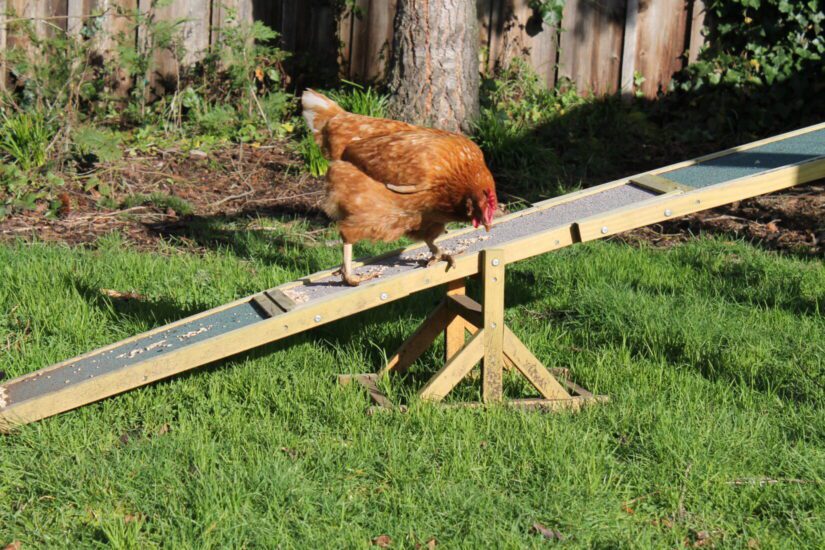
Dust bathing
Dust bathing is an important natural behaviour of chickens. Chickens have a gland on their back which produces oil that they spread on their feathers to waterproof them. Over time, the oil becomes stale and needs to be replaced – this is done through dust bathing! The dust sticks to the stale oil, removing it when they shake the dust out of their feathers. They can then spread fresh oil. Make sure you have an area of dirt for them to perform this behaviour.
Perches
Another natural behaviour of chickens is perching, as they feel safe up high away from predators. It’s important to provide perches inside their chicken coop at various heights and with enough space to accommodate all birds while roosting (sleeping). Perches should also be provided throughout their environment so they can feel safe while checking out their surroundings.
Nesting
Laying hens seek out quiet, private areas to lay their eggs. Ensure nest boxes are enclosed and consider adding curtains for an added layer of privacy so hens are at ease while laying their eggs.
Engage particular senses
Add bells throughout their environment for chickens to peck at and listen to their own music! Or add visually stimulating objects, such as mirrors or pinwheels, to spark their curiosity. Ensure mirrors are safe and will not break when chickens peck at their reflections.
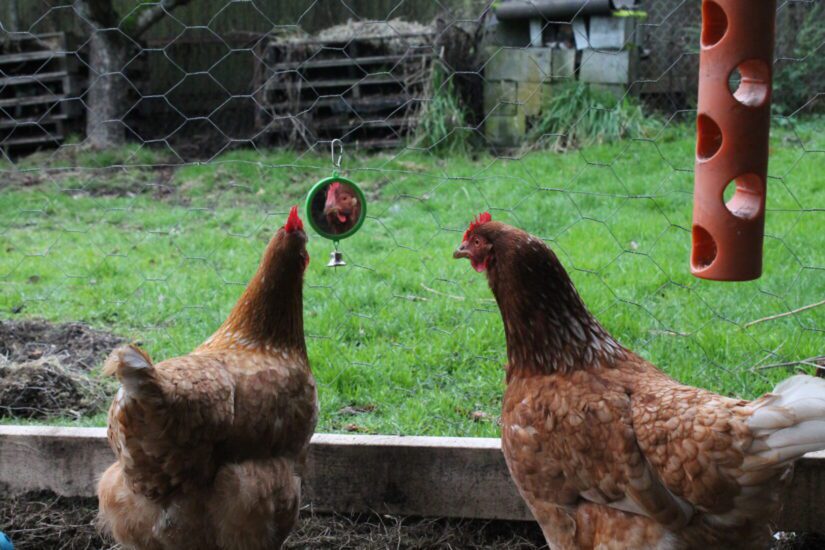
3. Food-based enrichment
Food-based enrichment encourages chickens to explore novel objects, and rewards them with treats for doing so!
Dig box
This is an enclosed space full of dirt, such as an old rubber tire, where chicken guardians can hide treats inside, encouraging a chicken’s natural behaviour to forage. When all the treats are gone, they can also use this as a dust bathing area!
Treat ball
This is a round ball filled with treats with holes cut into it – you can make your own or buy one from a pet store. Treats will roll out as the chickens peck and play with it.
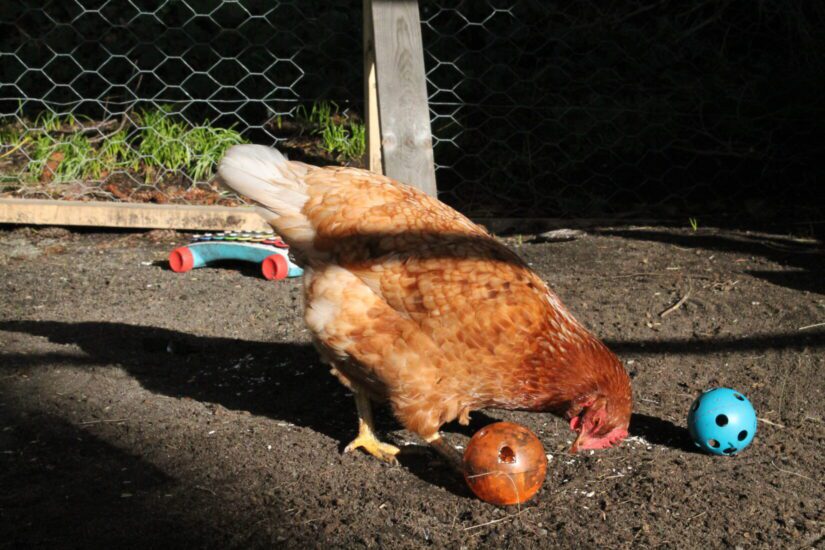
Hanging vegetables
Simply hanging vegetables, such as a head of lettuce, in the chicken enclosure is an easy way to add some fun. To make things more challenging, put vegetables in a cylinder with several holes through it, as shown in the video below.
Puzzle feeders
Puzzle feeders, such as those used for dogs or cats, are a great way to engage a chicken’s mind, and encourage problem-solving behaviours. Motivated by the treat reward, you may be surprised at just how quick your chickens figure it out!
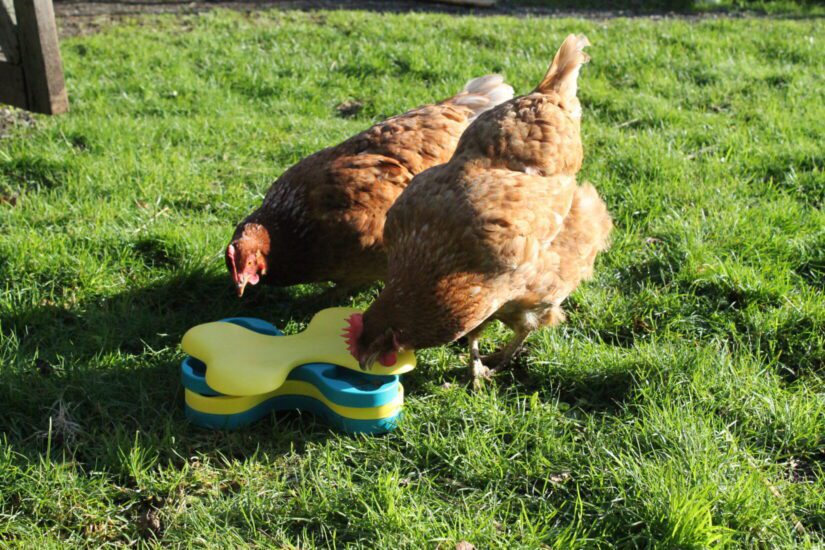
In order for enrichment to be beneficial to chickens, it’s important to always introduce novelty and variety. Chickens are smart animals and may become bored when provided with the same enrichment day after day. Incorporate new items and switch up their enrichment schedule to maintain an engaging and interesting environment.
Every chicken will respond differently to enrichment items, so be sure to provide multiple items at once to reduce squabbles, and so they can choose to interact with what makes them most happy.
Subscribe to FarmSense e-newsletter
FarmSense is delivered four times a year and includes news about farm animal welfare, and updates on what the BC SPCA is doing to help improve the lives of farm animals in Canada.
The BC SPCA uses your personal information to update you on our work for animals as well as for advertising and analytics purposes. More information on uses and how to opt-out can be found in our Privacy Policy.
